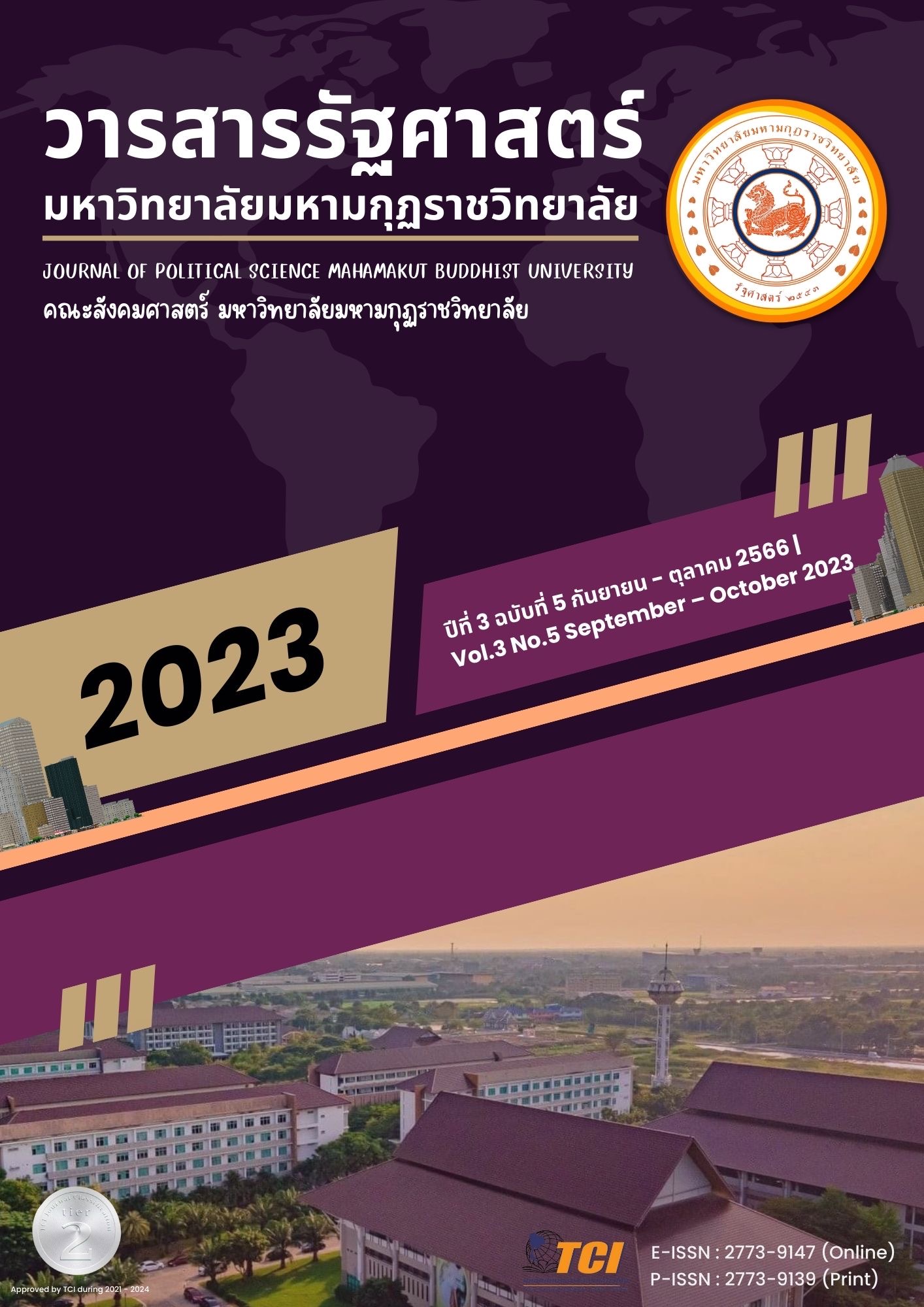A PERSONAL FINANCIAL MANAGEMENT GUIDELINE FOR RETIREMENT PLAN OF PRIVATE SECTOR PERSONNEL IN BANGKOK AND VICINITY
Main Article Content
Abstract
This research article has a purpose. to study 1) To identity problems a personal financial management for retirement plan of private sector personnel in Bangkok and Vicinity. 2) To describe personal financial planning of private sector personnel for retirement planning in Bangkok and Vicinity and 3) To propose a personal financial management guideline for retirement plan of private sector personnel in Bangkok and Vicinity. This article is a survey research and qualitative research. Use the interview form Data were collected from planning experts, senior management, manager position, 30 people. use a specific approach, survey research uses questionnaires. The population and sample are: private sector personnel in Bangkok and Vicinity. The zoning was randomly divided according to the area of the Provincial Social Security Office of 24 areas in 6 provinces, namely Bangkok, Nonthaburi, Nakhon Pathom, Pathum Thani, Samut Sakhon and Samut Prakan. 400 people were conveniently selected.
The research results showed that 1) problems a personal financial management for retirement plan of private sector personnel in Bangkok and Vicinity, namely Income clearly affects savings, Expenditure or high expenses may be attributed to an increase in cost of living, Family burden, taking care of th family, working people who need to take care of 2 generations of parents and children, in terms of financial behavior affects savings that are less or no savings at all, and financial literacy skilI lack of understanding of access to diverse and complex financial services. 2) Personal financial planning for private sector personnel consisting of Savings planning, Investment planning, Insurance planning, Retirement planning, Tax planning and Inheritance planning. and 3) a personal financial management guideline for retirement plan of private sector personnel in Bangkok and Vicinity, for the purpose of living through financial management and planning prevent problem and build wealth suggestions in managing savings for stable retirement.
Article Details

This work is licensed under a Creative Commons Attribution-NonCommercial-NoDerivatives 4.0 International License.
References
จุฬาลงกรณ์มหาวิทยาลัย. (2564). ‘จุฬาฯ’ ชี้คนไทยออมเงินน้อย มีความพร้อมหลังเกษียณต่ำกว่า 40% เรียกใช้เมื่อ 1 สิงหาคม 2566 จาก http://www.chula.ac.th/clipping/84815/
ตลาดหลักทรัพย์แห่งประเทศไทย. (8 เมษายน 2559). 4 รู้สู่ความมั่งคั่ง. เรียกใช้เมื่อ 1 สิงหาคม 2566 จาก https://www.setinvestnow.com/th/knowledge/video/85-4-steps-to-become-wealthy.
ธนาคารแห่งประเทศไทย. (2561). รายงานผลการสำรวจทักษะทางการเงินของไทย ปี 2561. ศูนย์คุ้มครองผู้ใช้บริการทางการเงิน ธนาคารแห่งประเทศไทย. กรุงเทพมหานคร: ธนาคารแห่งประเทศไทย.
นิพพิชฌน์ โกวิทวณิชกานนท์. (2559). คู่มือปฏิบัติงานสำหรับนายหน้าประกันชีวิต. กรุงเทพมหานคร: สำนักงานคณะกรรมการกำกับและส่งเสริมการประกอบธุรกิจประกันภัย (คปภ.).
ประกาศคณะกรรมการค่าจ้าง. (2565). เรื่อง อัตราค่าจ้างขั้นต่ำ (ฉบับที่ 11). ราชกิจจานุเบกษา เล่ม 139 ตอนพิเศษ 221 ง หน้า 4 (19 กันยายน 2565).
ปริวัตร ป้องพาล. (2563). การวางแผนการเงินส่วนบุคคลเพื่อสร้างภูมิคุ้มกันทางด้านเศรษฐกิจของครูและบุคลากรทางการศึกษา. ใน รายงานการวิจัย. สำนักงานคณะกรรมการส่งเสริมสวัสดิการและสวัสดิการครูและบุคลากรทางการศึกษา.
เพ็ญประภา เบญจวรรณ. (2558). การเตรียมความพร้อมก่อนการเกษียณอายุ. วารสารมหาวิทยาลัยนราธิวาสราชนครินทร์ สาขามนุษยศาสตร์และสังคมศาสตร์, 2(1), 84-85.
มูลนิธิสถาบันวิจัยและพัฒนาผู้สูงอายุไทย. (2564). รายงานสถานการณ์ผู้สูงอายุไทย พ.ศ. 2563. (พิมพ์ครั้งที่ 1). กรุงเทพมหานคร: มูลนิธิสถาบันวิจัยและพัฒนาผู้สูงอายุไทย.
รัชนีกร วงศ์จันทร์. (2553). การบริหารการเงินส่วนบุคคล. กรุงเทพมหานคร: ตลาดหลักทรัพย์แห่งประเทศไทย.
รัชนีกร วงศ์จันทร์. (2555). การบริหารการเงินส่วนบุคคล. กรุงเทพมหานคร : ตลาดหลักทรัพย์แห่งประเทศไทย
วราญาณ์ อิศรางกูร ณ อยุธยา. (2564). กับดักของการออมเงินเกษียณ ที่ทำให้ไม่ได้ตามเป้า. เรียกใช้เมื่อ 1 สิงหาคม 2566 จาก https://www.tfpa.or.th/datasource.php?topic=document&sub=article&tab=personal&pageNumber=6&id=794.
วิไลลักษณ์ ไทยอุตส่าห์ และวลัยภรณ์ อัตตะนันทน์. (2531). การเร่งการออมของครัวเรือนในประเทศไทย. ใน รายงานการวิจัย. มหาวิทยาลัยเกษตรศาสตร์.
ศูนย์ส่งเสริมการพัฒนาความรู้ตลาดทุน สถาบันกองทุนเพื่อพัฒนาตลาดทุน ตลาดหลักทรัพย์แห่งประเทศไทย. (2553). หลักสูตรวางแผนการเงิน: ชุดวิชาที่ 1 พื้นฐานการวางแผนการเงินหน้า กรุงเทพมหานคร: ตลาดหลักทรัพย์แห่งประเทศไทย.
สนทยา เขมวิรัตน์ และคนอื่นๆ. (2555). ปัญหาและแนวทางในการพัฒนาการออม:กรณีศึกษาชุมชนพระยาประสิทธิ์ เขตดุสิต กรุงเทพมหานคร: มหาวิทยาลัยเทคโนโลยีราชมงคลพระนคร.
สถาบันวิทยาการตลาดทุน, (2562). การออมเพื่อประชากรวัยเริ่มทำงาหน้าคณะนักศึกษาหลักสูตรผู้บริหารระดับสูงสถาบันวิทยาการตลาดทุน รุ่นที่ 29. กรุงเทพมหานคร: สถาบันวิทยาการตลาดทุน
สุดารัตน์ พิมลรัตนกานต์. (2555). การเงินส่วนบุคคล. กรุงเทพมหานคร: ซีเอ็ดยูเคชั่น.
สุดารัตน์ ทิพาพงศ์. (2564). แนวทางการวางแผนการเงินเพื่อคุณภาพชีวิตวัยเกษียณอายุ. วารสารบริหารนิติบุคคลและนวัตกรรมท้องถิ่น, 7(5), 355-356.
สำนักงานคณะกรรมการกำกับและส่งเสริมการประกอบธุรกิจประกันภัย. (2559). การวางแผนการลงทุนส่วนบุคคล. คู่มือปฏิบัติงานสำหรับนายหน้าประกันชีวิต. กรุงเทพมหานคร : สำนักงานคณะกรรมการกำกับและส่งเสริมการประกอบธุรกิจประกันภัย (คปภ.).
Atchiley, R.C. (1994). Social forces and Aging: An Introduction to Social Gerontoloty, Belmont, California: Wadsworth.
Bank of Thailand. (2018). Aging Society and the challenges of the Thai labor market. A study project on Thai economic structure that has implications for policy implementation. Monetary Policy Group Bank of Thailand. [In Thai]
Hall, R.E. and F.S. Mishkin., (1982). The sensitivity of consumption to transitory income: Estimate for panel data on households. Econometrica. Vol.50: pp 461-481.
Leedy, Jack J. Wynbarand. (1987). Executive Retirement Management. New York: Fact on File Publications.
Milton Friedman. (1957). A Theory of the Consumption Function (Permanent Income Hypothesis). Princeton University, 259.
Solem, P. E., Syse, A. Furunes, T. Myletun, R. J., De Lanfe, A. Schaufelik, W., & Ilmarinen, J. (2014). To leave or not to leave: retirement intentions and retirement behavior. Ageing & Society, 36, 259-281.
Xiao, Jing Jian & Olson, Geraldine. (2009). Mental accounting and saving behavior. Home Economics Research Journal. 22(1), 92-109.
Yamane Taro. (1973). Statistics: an Introduction Analysis. 3rd ed New York: Harper and Raw.
Yeung. (2013). Is Pre-retirement planning always good? An exploratory study of retirement adjustment among Hong Kong Chinese retirees. Aging Ment. Health, 17(3), 386-393.


